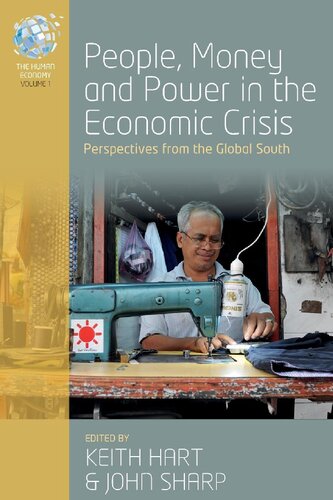(Ebook) People, Money and Power in the Economic Crisis: Perspectives from the Global South: 1 (The Human Economy, 1) by Keith Hart (editor), John Sharp (editor) ISBN 9781782384670, 9781782384687, 9781785333422, 1782384677, 1782384685, 1785333429, 2014016234
"This volume will be a valuable contribution to economic anthropology. The empirically rigorous cases reveal just why the methods that we associate with anthropology are fundamental to our understanding of the economy....[It] urges us to rethink what 'the crisis' - the aftermath of the 2008 financial meltdown - really is." · Erik Bähre, Leiden University"This series is more an agenda-setting enterprise than a mere book series. It promises to be the most important scholarly initiative to come from the global south in a very long time; one that is sure to change how we think about the world at large, about economy and humanity." · John Comaroff, Harvard UniversityThe Cold War was fought between "state socialism" and "the free market." That fluctuating relationship between public power and private money continues today, unfolding in new and unforeseen ways during the economic crisis. Nine case studies -- from Southern Africa, South Asia, Brazil, and Atlantic Africa - examine economic life from the perspective of ordinary people in places that are normally marginal to global discourse, covering a range of class positions from the bottom to the top of society. The authors of these case studies examine people's concrete economic activities and aspirations. By looking at how people insert themselves into the actual, unequal economy, they seek to reflect human unity and diversity more fully than the narrow vision of conventional economics.Keith Hart is a co-director of the Human Economy Program at the University of Pretoria and Centennial Professor of Economic Anthropology at the London School of Economics and Political Science. His recent books include The Human Economy: A Citizen's Guide (with Jean-Louis Laville and Antonio David Cattani, 2010) and Economic Anthropology: History, Ethnography, Critique (with Chris Hann, 2011).John Sharp is Professor of Social Anthropology at the University of Pretoria and co-director of the Human Economy Program. He taught at the Universities of Cape Town and Stellenbosch. He has published on the mission reserves of Northern Cape Province, the Bantustan of Qwaqwa, on the white Afrikaans-speaking inhabitants of Pretoria, and on the history of South African anthropology.
*Free conversion of into popular formats such as PDF, DOCX, DOC, AZW, EPUB, and MOBI after payment.


